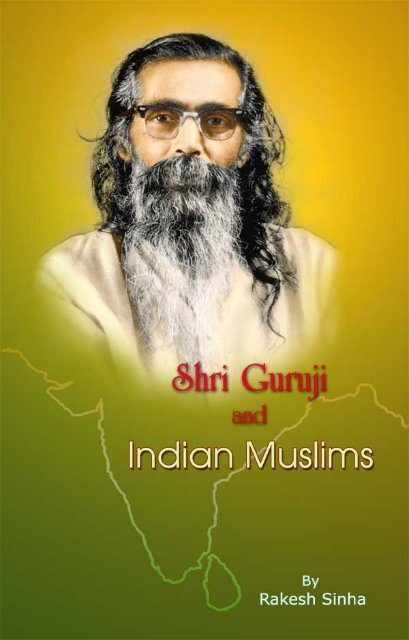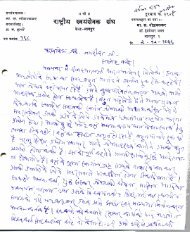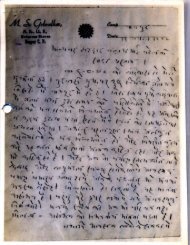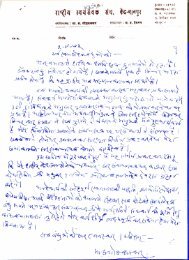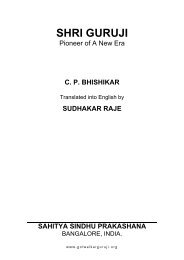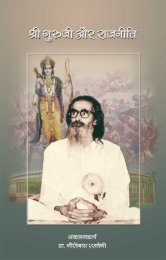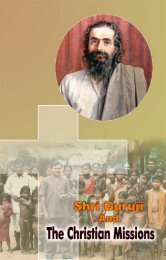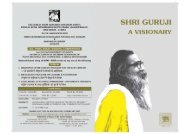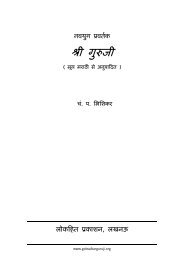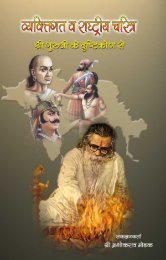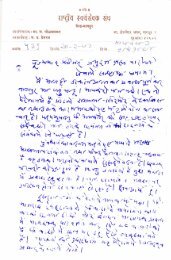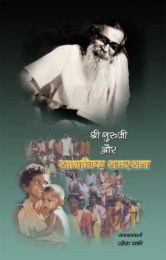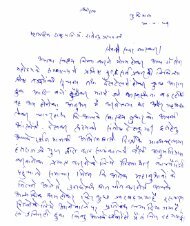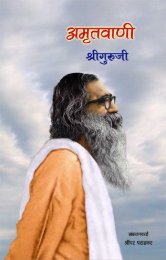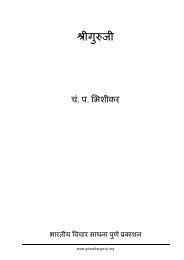Shri Guruji and Indian Muslim.pdf - Shri Golwalkar Guruji
Shri Guruji and Indian Muslim.pdf - Shri Golwalkar Guruji
Shri Guruji and Indian Muslim.pdf - Shri Golwalkar Guruji
Create successful ePaper yourself
Turn your PDF publications into a flip-book with our unique Google optimized e-Paper software.
<strong>Shri</strong> <strong>Guruji</strong><br />
And<br />
<strong>Indian</strong> <strong>Muslim</strong>s<br />
By<br />
Rakesh Sinha
Introduction<br />
The cultural nationalism has been a central theme in <strong>Indian</strong> social <strong>and</strong> political discourse<br />
since late 19 th century. A galaxy of thinkers, spiritual personalities <strong>and</strong> philosophers, which<br />
included people like Rajaram Mohan Roy, Swami Vivekan<strong>and</strong>a, Maharshi Aurovindo, B. C.<br />
Pal, Lala Lajpat Rai, B. G. Tilak, Mahatma G<strong>and</strong>hi, Bankim Chnadra Chatterjee, Ravindra<br />
Nath Tagore, Dr K. B. Hedgewar, V. D. Savarkar, Swami Dayan<strong>and</strong>a, M. S. <strong>Golwalkar</strong><br />
(<strong>Guruji</strong>), K. M. Munshi , Dr. B. R. Ambedkar, Jawaharlal Nehru, made enormous<br />
contributions to the evolution of idea <strong>and</strong> debate on it in the modern historiography. They<br />
differed with each other on many accounts <strong>and</strong> on their approaches to outline <strong>and</strong> define the<br />
contours of <strong>Indian</strong> nationalism but all of them largely concur that the cultural foundation<br />
gives shape to <strong>Indian</strong> nationalism. All of them perceived patriotism as a spiritual <strong>and</strong> cultural<br />
rather than a material concept. It is obvious from elevation of the country as ‘Mother’ <strong>and</strong><br />
‘Goddess’ by them. Moreover, the acceptance of Bankim’s V<strong>and</strong>e Mataram as a patriotic <strong>and</strong><br />
inspiring song in the collective conscience of the people itself tells that nation has been given<br />
higher status than religions <strong>and</strong> community’s identity. Mother India becomes the most<br />
inspiring <strong>and</strong> living deity irrespective of sects, philosophies, religions <strong>and</strong> regions. However,<br />
there has been a notable absence of <strong>Muslim</strong>s from such debate. Their hostility to this concept<br />
is very remarkable in the trajectory of <strong>Indian</strong> nationalism. Yet it is also not untrue that there<br />
are scattered instances of <strong>Muslim</strong> thinkers <strong>and</strong> literary figures who reinforced the idea of<br />
cultural nationalism. However, the Islamic religious discourses precluded such thinkers to<br />
sustain their ideology or lead to synthesis between indigenous ancestral culture <strong>and</strong> Islamic<br />
faith. Consequently, this could not turn it into an ideology of <strong>Muslim</strong> masses <strong>and</strong> remained<br />
confined to their personal conviction. The <strong>Muslim</strong> discourse has not only been predominantly<br />
based on pan Islam but also on the hostility to indigenous culture as a rival ideology <strong>and</strong><br />
tradition.<br />
The Congress effort to end this predicament of <strong>Indian</strong> nationalism during freedom<br />
movement culminated in the partition of the country. We find resolution of many unanswered<br />
questions in the philosophy of <strong>Shri</strong> <strong>Guruji</strong>. His spiritual self <strong>and</strong> tireless social -activism,<br />
made his thought original <strong>and</strong> pragmatic. He deals with very fundamental issue of<br />
detachment of <strong>Muslim</strong>s from the Hindu culture <strong>and</strong> nationalism. Unlike Pt. Jawaharlal Nehru<br />
there is no gap between his ideas <strong>and</strong> practice. Nehru’s ‘Discovery of India’ <strong>and</strong> his politics<br />
of survival are two extremes of his personality. <strong>Guruji</strong>’s Bunch of Thought is free from such<br />
hypocrisy .It reflects his spiritual mind, activist life <strong>and</strong> optimism of <strong>Indian</strong> tradition. The<br />
most noteworthy aspect of his articulation on <strong>Muslim</strong> question is that his pragmatism does<br />
not kill his optimism <strong>and</strong> idealism. I use the term ‘original’ for his thought on <strong>Muslim</strong><br />
question because he discusses issues <strong>and</strong> events, past, present <strong>and</strong> future of <strong>Muslim</strong>s in<br />
civilisational <strong>and</strong> cultural perspective unmindful of dominant political ideology on the one<br />
h<strong>and</strong> <strong>and</strong> populist approach to <strong>Muslim</strong> problem on the other. He applies practical wisdom to<br />
look into problems <strong>and</strong> their solutions rather than following either sheer conservative<br />
idealism or dogmatism. He rarely quotes philosophers <strong>and</strong> scriptures.<br />
In spite of his open <strong>and</strong> liberal perspective on the question of nationalism <strong>and</strong> secularism,<br />
he has been treated most unfavourably by Islamic scholars <strong>and</strong> secularist social scientists.<br />
Selective <strong>and</strong> out of context citation of his views is unparallel in <strong>Indian</strong> academic. They<br />
largely quoted a treatise “We or Our Nationhood Defined” which was published in 1939. A<br />
baffled <strong>and</strong> elusive domestic <strong>and</strong> international politics certainly influenced the contents of the<br />
book. Not much water has flown down the river of Gangas since <strong>Guruji</strong> was introduced in the<br />
ideological mission of the RSS. The fact is that the book ‘We…’ neither represents the views
of the grown <strong>Guruji</strong> nor of the RSS. He himself acceded this when he revealed that the book<br />
carried not his own views but was ‘an abridged version of G. D. Savarkar’s work Rashtra<br />
Mimnsa’ (Keer : 527). Yet secularist social scientists find great solace to quote “We”<br />
extensively. Infact the journey of his thought begins with his succession as the<br />
Sarsanghchalak of the RSS in 1940 <strong>and</strong> it continued till 1973 when he died. We find his<br />
absolute identification with the RSS. There is extraordinary consistency in his views. He<br />
created a parallel paradigm, which unequivocally pronounced that a<br />
civilisation-nation, India, with innumerable diversities has been one nation <strong>and</strong> one<br />
people rather than multi-nations <strong>and</strong> many people. His 33 years long discourse on the subject<br />
<strong>and</strong> practical wisdom demonstrated by him have been largely excluded by the secularists. It<br />
is not an exaggeration to say that vilification of <strong>Shri</strong> <strong>Guruji</strong> is thicker than all the mud in the<br />
<strong>Indian</strong> rivers. <strong>Guruji</strong> himself pointed out the malicious campaign against the RSS, “(the) aim<br />
of the Sangh is the same re- establishing the integrated feeling of oneness of the nation which<br />
has been flowing down since time immemorial. Some suspicions have been roused with<br />
regard to this, because the government <strong>and</strong> certain important members of the ruling party<br />
(Congress), <strong>and</strong> some other political parties have maliciously described it as<br />
subversive.”(G2000: 172) * . However, his deliberate misrepresentation in predominantly<br />
leftist social scientists is an example of use of unethical academic tool to camouflage their<br />
extreme ideological predisposition. Concomitantly such discourses by established social<br />
scientists continually eluded academic generations to make an objective assessment of <strong>Shri</strong><br />
<strong>Guruji</strong> who encapsulated his ideological mission as to “ “Worship the Nation”, “Worship the<br />
Ideal”.”(G 2000:483) 1 Calling him a communal is like calling cow a fox.<br />
<strong>Shri</strong> <strong>Guruji</strong> represents the Hindutva which provides immense space <strong>and</strong> opportunity for<br />
sub- identities, sub- cultures, languages, personal laws, cults <strong>and</strong> philosophies to endure <strong>and</strong><br />
flourish provided that the people accede that cultural interactions, assimilations,<br />
reconstructions, reforms <strong>and</strong> critical interpretations of traditions <strong>and</strong> rituals as necessary tools<br />
for human evolution <strong>and</strong> preserving civilisational –cultural identity of the nation. He does not<br />
formulate any separate ideological stream, which can be called as <strong>Golwalkar</strong>ism. His ideas<br />
unfolded Dr Hedgewar’s vision of Hindu Nation in the contemporary perspectives. His<br />
thought on secularism <strong>and</strong> nationalism is not only inseparable from the ideology of the RSS<br />
but also tradition of Cultural Nationalism. You reject him then you would be left with no<br />
justification to appreciate philosophy of Swami Vivekanada, Aurovindo, Bankimch<strong>and</strong>ra<br />
Chatterjee, B. C. Pal <strong>and</strong> others. As Haq wrote, “Nearly all the thinkers<br />
1 <strong>Guruji</strong> to All Swyamsevak brethren dated April 2 1973, it was his one of the last three letters written by<br />
him before his death.<br />
* For <strong>Guruji</strong> (<strong>Golwalkar</strong>) reference G has been used<br />
Beginning from Bankim Ch<strong>and</strong>ra to Bipinch<strong>and</strong>ra Pal (<strong>and</strong> Aurovindo Ghosh) to Annie<br />
Besant conceived the cult of nationalism as the purest form of religion <strong>and</strong> “nation” as the<br />
supreme deity.”(1992:20) <strong>Guruji</strong> is integrally associated with this Hindu thought process.<br />
Students of social science can be immensely benefited by his philosophy. The present work is<br />
a modest attempt to explore his views on <strong>Muslim</strong> problems <strong>and</strong> Islamic identity in the<br />
domain of Hindu (cultural) nationalism.
Chapter - I<br />
New Paradigm<br />
History of Islamic aggressions <strong>and</strong> perpetual offences against indigenous culture, sects<br />
<strong>and</strong> way of life <strong>and</strong> Islamic separatism resulting into two nations theory had certainly not<br />
been primary reasons for founding of the RSS in 1925.<br />
It was born amidst hordes of Hindu organisations including All India Hindu Mahasabha<br />
led by Hindu luminaries, like V. D. Savarkar, Dr. B. S. Moonje, Bhai Parmamn<strong>and</strong>a, Dr.<br />
Shyama Prasad Mookerjee <strong>and</strong> others. Dr. Hedgewar founded the RSS with a positive note of<br />
reorganising <strong>and</strong> mentally reorienting the Hindus beyond sectarian <strong>and</strong> narrow barriers <strong>and</strong><br />
feelings, like caste, sect, creed, language <strong>and</strong> above all rabid individualism. He aimed to<br />
resurrect progressive cultural identity in purely nationalistic terms. It was, therefore, also a<br />
disapproval of the contemporary Hindu Movement obsessed with terms of reference of<br />
Islamic aggression. The stories of grave atrocities <strong>and</strong> acts of barbarism committed by<br />
Islamists for centuries are certainly useful lessons of history to correct our approach to<br />
nationalism, strengthen inner resilience of the nation <strong>and</strong> to make categorical distinctions<br />
between a national <strong>and</strong> an alien. However, the history <strong>and</strong> ideology of Islam in India cannot<br />
be the foundational elements of the Hindu movement. Dr. Hedgewar underlined the<br />
importance of creating solidarity among Hindus as a national community. This would entail a<br />
transformation in the <strong>Muslim</strong> mind <strong>and</strong> pave the way for assimilation. Thus the RSS made a<br />
clear departure from the contemporary discourse of the Hindu Movement. For Dr. Hedgewar<br />
regeneration <strong>and</strong> rekindling of nationalism was a ceaseless process just like the motion of the<br />
earth. He prevented contemporary narrow discourses to become the central issue of the RSS<br />
ideology. For instance, he differed with Dr. B. S. Moonje, Hindu Mahasabha leader, on the<br />
question of British Imperialism vis-à-vis <strong>Muslim</strong> problem (Sinha, 2003: 118-119). 2<br />
Moreover, Colonel U. N. Mookerjee 3 added an exciting issue in the contemporary<br />
discourse by his thesis that Hindus would be turned into minority <strong>and</strong> <strong>Muslim</strong>s into majority<br />
if besides demographic trend, social schism among Hindus would remain unchanged. He<br />
summed up: ‘they (<strong>Muslim</strong>s) count their number, we calculate our losses. (Mookerjee: 1909)<br />
Swami Shradhn<strong>and</strong>a’s influential work “Hindu Rashtra: Saviour of the Dying Race” came in<br />
1926. By this time the idea of demographic decline had become entrenched as a core feature<br />
of Hindu Nationalism. (Zavos: 109) Dr. Hedgewar had not used it either to explain the<br />
concept <strong>and</strong> ideology of Hindu Nation or exp<strong>and</strong> the organisation. In fact he was working on<br />
a civilisational vision to revive the confidence, sense of nationhood <strong>and</strong> intellectual potential<br />
<strong>and</strong> consolidation on social <strong>and</strong> national planes of the Hindus. It was a subtle <strong>and</strong> silent shift<br />
from the contemporary underst<strong>and</strong>ing of the Hindu organisations <strong>and</strong> their leadership. They<br />
had been showing concern only for numerical <strong>and</strong> political superiority of the Hindus vis a vis<br />
<strong>Muslim</strong>s. The new paradigm was strengthened by ideological sharpness, <strong>and</strong> forthrightness<br />
of <strong>Shri</strong> <strong>Guruji</strong>. The distinction between the two provided consistency to the RSS ideology<br />
<strong>and</strong> its distinct identity. <strong>Guruji</strong> succinctly stated that any attempt to reorganise our society on<br />
the basis of hatred of the <strong>Muslim</strong>s “would therefore be to court degeneration <strong>and</strong> disaster. For<br />
that would pollute our minds by constant remembering of their heinous crimes…it is true that<br />
sometimes Sangh workers too refer incidents involving <strong>Muslim</strong>s …but that is only to draw<br />
attention to the lessons we have to learn from history.”(G2000: 231) He further noted that<br />
“Some extreme Hindu bodies came into existence in our country to counteract the growing<br />
violence <strong>and</strong> depredations of <strong>Muslim</strong>s <strong>and</strong> to put a check to their appeasement in the political<br />
field, they recounted again <strong>and</strong> again the harrowing tales of the blood –curdling
2 Dr. Moonje in his speech stated that the British government should continue till the Hindus<br />
could not feel to overtake <strong>Muslim</strong>s <strong>and</strong> confidant to dominate the polity of the country. Dr.<br />
Hedgewar showed his displeasure on his argument. Moonje’ diary, B. S. Moonje, Private<br />
papers, NMML, New Delhi.<br />
3 Mookerjee was a son in law of <strong>Shri</strong> Surendranath Banerjee.<br />
Massacres, forcible conversions, raping of women, desecration of temples <strong>and</strong> all such<br />
atrocities perpetrated by the <strong>Muslim</strong>s ever since they stepped on their soil. …. It is this<br />
atmosphere of reactionary mentality that makes people view the Sangh also in the same<br />
light.” (G2000: 232) He cites an example of <strong>Muslim</strong>ised perspective ensconced among<br />
average Hindus about their own organisations. When he visited a new place to start the work<br />
there a gentleman of the town confronted him with the question, “well, where is the need for<br />
the Sangh in our town? There are no <strong>Muslim</strong>s here.” He responded, “We have come here to<br />
organise Hindus <strong>and</strong> not <strong>Muslim</strong>s. I hope you are all Hindus. How are we concerned whether<br />
<strong>Muslim</strong>s reside here or not.”? (G2000: 232) Social divisions, lack of solidarity among Hindus<br />
allured the aggressors to fulfill their destructive desires from Ghazani to Jinnah. It is a fact<br />
that an unhealthy body cannot take the bull by the horns. So, for both Hedgewar <strong>and</strong> <strong>Guruji</strong><br />
the primary task was to set right Hindus’ home first.<br />
Both set of people, firstly, ‘political Hindu ’ <strong>and</strong>, secondly, ‘Hindus out of reaction’ can<br />
not provide leadership for the reconstruction of Hindu society. (G 2000:60) That’s why while<br />
explaining the purpose behind the formation of the VHP he accentuated that their works<br />
should not be “reactionary in nature nor in content.” G1979: 16) He proclaimed,<br />
“It is not because Christians <strong>and</strong> <strong>Muslim</strong>s are active against us, that we<br />
have to work for our society <strong>and</strong> dharma… for remember that even if there<br />
were not a single Christian mission or <strong>Muslim</strong>s Majlis (congregation) to work<br />
against us, it would always be necessary to work for our religion, society <strong>and</strong><br />
the nation. With this positive idea the VHP has come into being.” (Ibid)<br />
Such constructive approach to Hindu organisation, leadership, ideology <strong>and</strong> programmes<br />
provided the solid foundation <strong>and</strong> resilience to the RSS. <strong>Guruji</strong> views <strong>Muslim</strong> question from<br />
the cultural nationalist perspective rather than Semitic <strong>and</strong> non Semitic division, with the<br />
assimilative spirit <strong>and</strong> yearning than confrontationist <strong>and</strong> majoritarian position. He begins his<br />
reconstruction of national community by presuming the presence <strong>and</strong> perpetuation of alien<br />
mentality in the nation’s body politic. He defines, what is called, ‘national’ as follow:<br />
‘People whose loyalty to the country <strong>and</strong> her traditions, to her heroes down the centuries,<br />
to her security <strong>and</strong> prosperity, is undivided <strong>and</strong> unadulterated, are national.” In a similar<br />
manner he traces the germs of separatism in the wrong notions of identity upheld by any<br />
community as a whole or majority of them,<br />
“Groups who continue to believe themselves to be aliens, aggressors, victors <strong>and</strong><br />
erstwhile masters <strong>and</strong> rulers of the country, are aliens evidently, <strong>and</strong> when there is desire to<br />
re-establish themselves as such rulers are also hostiles.”(G2000: 173) Both the definitions<br />
explicate the difference of approaches of the Hindus <strong>and</strong> the <strong>Muslim</strong>s to India’s freedom<br />
movement.
Chapter - II<br />
Aggressors <strong>and</strong> Converts<br />
The advent of Islam in India was not only an addition of a new religion in the Hindu<br />
civilisation but also the beginning of ceaseless social <strong>and</strong> religious confrontations. It<br />
repudiated age-old convention of religious freedom. Aggressors were conscious of inclusive<br />
nature of Hindu civilisation. Assimilative character of Hindu cultural environment was, in the<br />
eyes of <strong>Muslim</strong> elites a serious threat to <strong>Muslim</strong> way of life <strong>and</strong> called for ‘constant vigilance<br />
<strong>and</strong> effort’ to thwart it. (Madan1997: 112) 4<br />
<strong>Guruji</strong> points out,“Many persons came to this country from various parts of the world.<br />
They have chosen to stay here. They have adapted themselves to the life here, the ideology<br />
<strong>and</strong> philosophy here. Some have made their own contribution towards enriching this<br />
mainstream. The <strong>Muslim</strong>s unfortunately, stayed apart.”(<strong>Guruji</strong>: 1974:48)<br />
Thus a trail of two civilisations continued for more than thous<strong>and</strong> years. While one had<br />
the state power, organised force with a mission <strong>and</strong> a zeal to exp<strong>and</strong> Islam, another had<br />
‘highly developed civilisation, religious traditions which were radically different’ (Madan<br />
1997:145) extremely disorganised polity <strong>and</strong> divided social structure. There is no parallel of<br />
the heroic tales of the people who resisted religious onslaught<br />
4 Also see Qureshi, Ishtiaq Hussain, The <strong>Muslim</strong> Community of Indo Pakistan Subcontinent’ 1962, (610-<br />
1947), P.103<br />
From generations to generation <strong>and</strong> despite all the criminal <strong>and</strong> barbaric acts committed<br />
by the <strong>Muslim</strong>s, Hindu civilisation stood the test of time. Numbers of Hindus, who<br />
surrendered to Islam or forcibly converted, were far less than number of people killed by the<br />
aggressors. Sikh gurus faced persecutions to save the indigenous culture <strong>and</strong> traditions.<br />
<strong>Guruji</strong> draws a line between <strong>Muslim</strong> aggressors <strong>and</strong> the converts. Aggressors belonged to<br />
different race; nationality, civilisation <strong>and</strong> culture while the converted <strong>Muslim</strong>s have<br />
commonality with Hindus. They have common ancestors, common culture <strong>and</strong> history.<br />
<strong>Guruji</strong> follows more comprehensive criteria to define a Hindu. He says, “We are not so mean<br />
as to say that with a mere change in the method of worship an individual ceases to be a son of<br />
the soil. We have no objection to God being called by any name whatever …he can not be a<br />
Hindu at all who is intolerant of other faiths” (G 2000: 125) 5<br />
How can a body of converts claim separate culture or disassociate with their ancestors<br />
<strong>and</strong> delink themselves with the history <strong>and</strong> trajectory of the national life? <strong>Guruji</strong> feels that<br />
<strong>Indian</strong> <strong>Muslim</strong>s have been trying to compartmentalise all aspects of their life whether it may<br />
be language, culture, uniforms <strong>and</strong> festivals or national heroes. He says, “Why should they<br />
(<strong>Muslim</strong>s) behave as they are doing? As a matter of fact, in no other country in the world,<br />
where Islam has spread, the earlier dress, the language, the way of living etc., of those<br />
countries have changed. In Iran, Turkey <strong>and</strong> other countries their original dress, language,<br />
view of life etc., have remained the same. But in our country everything, even thinking also,<br />
is changed.”(<strong>Guruji</strong>, 1974:46)<br />
<strong>Shri</strong> <strong>Guruji</strong> begins with his theory that people of the l<strong>and</strong> irrespective of their religious<br />
beliefs belong to the same cultural <strong>and</strong> ancestral origin <strong>and</strong> says, “<strong>Muslim</strong>s must realise that<br />
we are all one people <strong>and</strong> it is the same blood that courses in our veins. They are not Arabs or<br />
Turks or
5 Chetan Bhatt interprets <strong>Guruji</strong>’s views anarchically <strong>and</strong> presumably to prove the<br />
hypothesis of equivalence between the ideology of Hindutva <strong>and</strong> Nazi <strong>and</strong> other<br />
philosophies rejected by the RSS. See the point made by Bhatt,“<strong>Guruji</strong> proposed that all<br />
minorities had become Hindus not through a conscientious <strong>and</strong> voluntary choice that<br />
accompanies religious affiliation but against their will <strong>and</strong> conviction <strong>and</strong> under an<br />
explicit <strong>and</strong> palpable threat of violence” (Bhatt2001: 131)<br />
Mongols. They are only Hindu converts…the problem can <strong>and</strong> must be solved by <strong>Indian</strong><br />
<strong>Muslim</strong>s owning the country <strong>and</strong> its ancient culture as theirs. <strong>Indian</strong> history did not begin<br />
with Mohammed Ghazni” (G: 1974:43-44)<br />
<strong>Guruji</strong>’s proposition is absolutely free from any ambiguity. He says that no race,<br />
community or nation can claim to be the custodian of all wisdom <strong>and</strong> discard rest of the<br />
humanity. Creative wisdom is not confined to some people. He says, “No people on the face<br />
of this earth are entirely without some abiding virtues, nor will they be endowed with all the<br />
necessary noble qualities...there are indeed very pious people worthy of emulation in all<br />
countries.”(G 2000:346) K. S. Durrany wrote,<br />
“The RSS does not preach that Hinduism is the only religion in the world.<br />
The concept of finality <strong>and</strong> paramountcy of a single shed of divine revelation<br />
has always been alien to Hinduism <strong>and</strong> it appears that the RSS wants to retain<br />
that religious diversity with a sense of cultural unity throughout the length<br />
<strong>and</strong> breadth of the country.” 6 (Durrany: 86)<br />
<strong>Guruji</strong> believes that philosophical <strong>and</strong> spiritual diversities need to be protected <strong>and</strong><br />
encouraged. Cultural assimilation does not mean negation or rejection of freedom of religion.<br />
It does not “mean that anyone should give up his way of worship. We can never advocate<br />
this, or even think of it. We believe that one single way of worship is not suitable for the<br />
whole of humanity.”(Jeelany; 48) His submission is that Hindu way of life is based on this<br />
very concept. It is originally inbuilt in the Hindu civilisation. So any sermon on secularism to<br />
Hindus is like using c<strong>and</strong>le in daylight. Prof. Moazziz Ali Begh underpins <strong>Guruji</strong>’s argument<br />
stating that; “I have found average Hindu ethically far more elevated than an average<br />
<strong>Muslim</strong>. A Hindu is definitely more humble <strong>and</strong> mild, <strong>and</strong> a <strong>Muslim</strong> (barring the truly God<br />
loving people) is definitely more arrogant <strong>and</strong> aggressive.”(1992: 85) <strong>Guruji</strong> further<br />
elaborates the difference between tolerance <strong>and</strong> respect as follow, “The word ‘tolerance’<br />
which is often used to express this idea (Truth is one, sages call it variously) is very meek, it<br />
is just another word for sufferance. It implies an element of ego, which just tolerates other<br />
viewpoints without<br />
6 Dr. Durrany, KS, associated with <strong>Indian</strong> Institute of Islamic Studies.<br />
any love or respect for them. But our training has been one of respecting <strong>and</strong> even<br />
accepting other faiths <strong>and</strong> viewpoints as so many paths to reach the same Truth.”(G: 2000:<br />
38) The <strong>Muslim</strong> mind does not accept this. As one of them writes,<br />
“Positive respect breeds nothing but stagnancy…two diametrically opposed<br />
viewpoints can tolerate each other, but they can not be expected to respect<br />
each other.”(Maualan Akhlaq Ahmed Qasimi, secularism: mazhabi rawadari<br />
(secularism: Religious Tolerance)(Urdu daily Al Jamiyat, Delhi July30, 1969)<br />
This clearly shows Islamic mind is not prepared to rehearse its basic framework of<br />
religious philosophy.
Nehru’s following bunch of self -introspective questions to <strong>Muslim</strong>s is virtually<br />
repudiation of their attitude, mindset <strong>and</strong> philosophy of life <strong>and</strong> vindicates <strong>Guruji</strong>. Nehru<br />
spoke only a few months after the independence before the educated <strong>Muslim</strong> audience of the<br />
Aligarh <strong>Muslim</strong> University (AMU), which was considered a breeding ground for Two Nation<br />
(Pro –Pakistanis) during the colonial period. He observed,<br />
“I have said that I am proud of our inheritance <strong>and</strong> our ancestors who<br />
gave an intellectual <strong>and</strong> cultural pre-eminence to India .How do you feel<br />
about this past? Do you feel that you are also sharers in it <strong>and</strong> inheritors of it<br />
<strong>and</strong>, therefore, proud of something that belongs to you as much as to me? Or<br />
do you feel alien to it <strong>and</strong> pass it by without underst<strong>and</strong>ing it or feeling that<br />
strange thrill which comes from the realisation that we are the trustees <strong>and</strong><br />
inheritors of this vast treasure…You are <strong>Muslim</strong>s <strong>and</strong> I am a Hindu …but that<br />
does not take away from that cultural inheritance that is yours as well as<br />
mine.”(Convocation address at the AMU, 24 January 1948).
Chapter - III<br />
Green Peril<br />
<strong>Guruji</strong> was a practising ideologue. He views that philosophy of cultural nationalism does<br />
not deny space to pluralism in social <strong>and</strong> religious life. In fact religion does not find pivotal<br />
position in the concept of cultural nationalism. Thus he withdraws the role of religion in the<br />
formulation of nationality. He also does not find any direct relationship between secularism<br />
<strong>and</strong> nationalism. It is a mistaken idea to correlate them. Sociology of religion reflects nature<br />
of the society <strong>and</strong> its civilisational roots. Nationalism is based on mental allegiance of the<br />
people to a their nation. It is not plausible that the change in religious composition would<br />
affect nationalist spirit. Nationality does not change with the change in religion in India. (G<br />
IX: 45)<br />
<strong>Guruji</strong> uninhibitedly argues, “ My feeling is that the nature abhors excessive uniformity.<br />
It is too early to say what these uniformities will do to western civilisation in times to<br />
come. Apart from the here <strong>and</strong> the now we must look back into distant past <strong>and</strong> also<br />
look forward to the remote future…we in this country have millennia of experience. We<br />
have the tested way of life. And our experience is that variety <strong>and</strong> unity can go<br />
together.” 7 . He believes that there has not yet been any honest efforts to either remove their<br />
misgivings or to assimilate them. He wisely believes that hope for assimilation cannot be<br />
generated either by appeasing them or reviling their sentiment. One should not be artificial<br />
while interacting with them at any plane. Pleasantly responding to Id’s greeting by a <strong>Muslim</strong><br />
he stated that, “All sacred religious festivals have one common objective to remind people<br />
about devotion to God.” (G VIII: 157). 8 His social philosophy can be summed up as<br />
progressive harmonisation between religion <strong>and</strong> Sanatan Dharma or eternal culture of Bharat.<br />
7 Motherl<strong>and</strong>, 23 August 1972; <strong>Guruji</strong>’s expression of <strong>Indian</strong> pluralism militates the<br />
historical experiences of European civilisation. That’s why many of the European<br />
thinkers from James Mill to Valentinen Chirol condemned the <strong>Indian</strong> pluralism. To chirol<br />
India was antithesis of word national empires, for the population of India cojusted of<br />
‘variegated jumble of races <strong>and</strong> peoples, castes <strong>and</strong> creeds.”(Panikkar: 25)<br />
8 <strong>Guruji</strong> to Muhammed Rafi, March 3, 1970,<br />
Here there is no place for religious egoism or sense of superiority. Locked <strong>and</strong> aggressive<br />
<strong>Muslim</strong> mind could not shake his firm belief <strong>and</strong> confidence in his own ideological moorings<br />
of religious freedom. His dialogue with a Kashmiri Sufi Nazir Ahmed in Aligarh presents a<br />
contrast between the Hindu <strong>and</strong> <strong>Muslim</strong> perceptions of achieving harmony <strong>and</strong> peace.<br />
Ahmed suggested him that ‘the threat of godlessness <strong>and</strong> communism was overtaking all of<br />
us <strong>and</strong> we who believe in God should get together to meet the threat’. Showing his complete<br />
approval with his proposition <strong>Guruji</strong> tried to unravel his mind. <strong>Guruji</strong> said, “I perfectly agree<br />
with you but the difficulty is that we have, as it were, broken the image of God, <strong>and</strong> each one<br />
has got his own piece. So what is to be done? You think of God in one particular way, the<br />
Christians think in another, Buddhism says there is no God, there is, only Nirvana; the Jain<br />
will say it is nothing; then so many will say we worship God in the form of Rama, Krishna,<br />
Shiva etc. How to ask these people to believe in one common God? Have you any recipe for<br />
this? Now this Kashmiri man known to be Sufi, which I take to be thinker <strong>and</strong> God -minded<br />
man, you will be surprised at his answer. He said, why not all of you come to<br />
Islam.”(Emphasis added) <strong>Guruji</strong> was amazed by the answer because Sufis are known as<br />
liberal rather than fundamentalist. Then <strong>Guruji</strong> argued, “Don’t you think that people will say,
why not join Christianity? Suppose, I devote as I am to my religion, say why not become a<br />
Hindu. It comes to the same thing <strong>and</strong> the problem will never end.”Ahmed wanted to know<br />
whether <strong>Guruji</strong> had solution to this vexed question. Here <strong>Guruji</strong> showed his finest<br />
philosophical aptitude when he argued,<br />
“There is no substantial philosophy which does not belong to the Hindus or to the<br />
<strong>Muslim</strong>s. Call it Advaita or whatever you like. It says that there is one single existence,<br />
which is truth, which is bliss. It is the Creator, Sustainer <strong>and</strong> Destroyer. All our conceptions<br />
of God are only limited conception of that ultimate reality, so that the rock bottom of ultimate<br />
reality will join us together. It does not belong to any one religion. Everyone can accept it on<br />
this account. Religion is only way of worship. This is not such a way; it is a philosophy. It is<br />
the philosophical underst<strong>and</strong>ing of the world. It can be taken to be the rock bottom.”(Jeelany:<br />
46)<br />
<strong>Guruji</strong> advised Ahmed that as a Sufi he should accept it. His proposition, is in fact, a<br />
question before the <strong>Muslim</strong>s of India whether they are prepared to respect the vision <strong>and</strong><br />
wisdom of the Mother country which provided them opportunity to live, prosper, govern<br />
despite their antipathy to whatever belonged to Hindu civilisation before <strong>and</strong> after their<br />
advent to <strong>Indian</strong> soil.
Chapter – IV<br />
RSS <strong>and</strong> Islam<br />
<strong>Guruji</strong>’s ideological conviction is in a complete countenance with the Vedic philosophy,<br />
“Truth is One, Sages call it variously” (Ekam Sat, Viprah bahudha wadanti). He describes it<br />
as a ‘Himalayan vision’ (G2000: 38). At another place he says that he does not consider<br />
anybody whether <strong>Muslim</strong> or Christian as alien if one demonstrates his unqualified loyalty for<br />
the Bharat. (Banka: Vol.II: 142) 9<br />
Expectedly, the <strong>Muslim</strong> thinkers <strong>and</strong> theologians take such proposition as all religions are<br />
equal <strong>and</strong> deserve respect as an insult of Islam. As Shaz says that considering Islam at par<br />
with Hinduism is a ‘mischievous idea’. (Shaz: 69) Another <strong>Muslim</strong> mind makes the thing<br />
clearer. Kettani wrote, “The process of assimilation is particularly effective when the <strong>Muslim</strong><br />
community has no special schools for its children <strong>and</strong> does not have adequate number of<br />
mosques for its adults...<strong>Muslim</strong>s should continue to believe that Islam is the only true<br />
religion <strong>and</strong> that all other religions, as stated in the Holy Quran will be rejected by the<br />
Creator. Believing that all religions are equally valid is the first sign of religious<br />
assimilation.” (Kettani: 10-11)<br />
<strong>Muslim</strong>s are not to be solely blamed for their alienation from Hindus <strong>and</strong> the<br />
indigenous culture. The process of their integration with the national life, which was in<br />
vogue, however intermittently, says <strong>Guruji</strong> was disrupted by the British colonialism by<br />
applying divide <strong>and</strong> rule.<br />
(G IX: 47) After independence this process has been blocked by vote hungry politicians. He<br />
also blames ‘extremely narrow minded religious leaders’ for creating schism <strong>and</strong> not viewing<br />
the problem of integration<br />
9 Memoir of <strong>Shri</strong> Madhavrao Mule<br />
from the ‘whole national concept in their mind.’(Jeelany, 46-47). He genuinely feels that<br />
the responsibility to create inter communal harmony lies on both Hindus <strong>and</strong> <strong>Muslim</strong>s <strong>and</strong><br />
adds that there is an odd which discourages such constructive approach, “our leaders are<br />
prone to put blame on Hindus <strong>and</strong> absolve the <strong>Muslim</strong>s. This has given the minority<br />
community, that is, the <strong>Muslim</strong>s, encouragement to continue to indulge in their own<br />
communal activities.”(Jeelany. 47) 10<br />
<strong>Guruji</strong> does not use the term Hindu as a classical religious concept. His idea is similar to<br />
B. C. Pal who points out that Hindu Culture is the very soul <strong>and</strong> essence of what we now<br />
underst<strong>and</strong> as nationalism. He too does not equate Hinduism with a religious concept. (Pal:<br />
p81) It is a mistaken idea that Hinduism is parallel to Islam. Heinrich Von Stietencorn rightly<br />
says, “Why is “Hinduism” so difficult to define? It is because we always try to see it as one<br />
“religion”. Our problems would vanish if we took “Hinduism” to denote a socio-cultural unit<br />
or civilisation which contains a plurality of distinct religions.”(G2001: 38) He says,<br />
“Hinduism is a civilisation formed <strong>and</strong> enriched by a group of religions which developed a<br />
particularly liberal way of coexistence <strong>and</strong> interactions between themselves.”(Ibid: 40)<br />
Hindu Rashtra <strong>and</strong> <strong>Muslim</strong>s:<br />
<strong>Guruji</strong>’s prescription that India is a Hindu Rashtra becomes confounded when it is<br />
superficially perceived from the western philosophical <strong>and</strong> terminological parameters. Its<br />
semblance to theocratic nation can then be superficially created.<strong>Guruji</strong> says that the fear that<br />
Hindu Rashtra “will imperil the existence of other religious groups arises by applying
Semitic yardstick to it <strong>and</strong> imagining that the concept of Hindu Rashtra is analogous to that<br />
of the Semitic states notorious for their religious bigotry <strong>and</strong> persecutions.”(G 2000:160) 11<br />
10 The dem<strong>and</strong> for reservations on communal line is reinvented by Hindu leaders who have little or no corrective<br />
memory or study of our history of fermentation of separatism in the midst of secular, democratic <strong>and</strong> anti –imperialist<br />
struggle led by the Congress <strong>and</strong> G<strong>and</strong>hi. If one leader says that the precondition of any alliance should be the <strong>Muslim</strong><br />
Chief Minister of a state, what does it mean? The state of Andhra Pradesh provided five percent reservations to<br />
<strong>Muslim</strong>s. Urdu has been declared second official language in many states.<br />
11 In Burma publishing of Quran needs official permission they are forbidden from performing hajj. (Kettani: 142) in<br />
Canada Islam is not recognised on equal footing with Christianity. (Kettani: 207)<br />
He firmly rejects the communal state <strong>and</strong> says non-communal state has always<br />
been a feature of <strong>Indian</strong> culture except two occasions, during Buddhist <strong>and</strong> <strong>Muslim</strong>s rule.<br />
(G IX: 67)<br />
He defines the non-communal state as follow, “if the state does not meddle into religious<br />
issues then the state would be called non-communal. Even if a <strong>Muslim</strong> would be the Prime<br />
minister of India then too the state would be non communal. If he would try to metamorphose<br />
the culture of the country then he would be democratically defeated because his action would<br />
be against the interests of the people.”(G IX: 68) Thus he argues that exclusive Hindu state<br />
that denies citizenship to minorities or treats them unequally is “a phantasm created by<br />
overstrained nerves <strong>and</strong> too lively an imagination, deserving only to be ignored as not worthy<br />
of consideration.”<br />
Unlike the western model of secularism, he does not take into account numerical value of<br />
any religious community. He believes there are one people in a nation with diverse<br />
approaches of their lives. There is no religious pre condition for patriotism or nationality.<br />
Partition<br />
During colonial period, the RSS maintained that unity of anti-imperialist struggle should<br />
not be disrupted on the basis of respective ideologies of contemporary social, cultural, caste,<br />
religious <strong>and</strong> political organisations on the one h<strong>and</strong> <strong>and</strong> personal ambitions, caste or<br />
community’s interests on the other. Despite its serious ideological differences with the<br />
Congress, particularly on minority issue, the RSS, in the given circumstances <strong>and</strong> limitations,<br />
unflinchingly supported the Congress programmes. Most remarkably, it has not raised any<br />
issue or led campaign, which could weaken the national movement. The <strong>Muslim</strong>s attitude to<br />
the national movement was one of self-exclusion <strong>and</strong> divisive. In 1905 at Benaras session of<br />
the Congress number of <strong>Muslim</strong> delegates fell to 17 out of total delegates 756. (Rajput: 18)<br />
<strong>Guruji</strong> draws a parallel between their role in the medieval <strong>and</strong> modern period of <strong>Indian</strong><br />
history. He sensibly says, “The <strong>Muslim</strong> desire, growing ever since they stepped on this l<strong>and</strong><br />
some twelve Hundreds years ago, to convert <strong>and</strong> enslave the entire country could not bear<br />
fruit, in spite of their political domination for several centuries. In the coming of the British<br />
they found an opportunity to fulfill their desire. They played their card shrewdly… <strong>and</strong><br />
ultimately succeeded in browbeating our leadership into panicky surrender before their sinful<br />
dem<strong>and</strong> of Partition.”(G2000: 178-179).<br />
<strong>Guruji</strong> says that had the Congress leadership taken the right <strong>and</strong> rational approach things<br />
would have been different. When the <strong>Muslim</strong> question came before them they showed the<br />
lack of conviction, clarity <strong>and</strong> confidence. They were not prepared to contemplate alternative<br />
method. Cultural nationalism propounded <strong>and</strong> successfully practised by Lokmanya B. G.<br />
Tilak <strong>and</strong> his contemporary was rejected by them. <strong>Guruji</strong> says the remedy of the <strong>Muslim</strong><br />
separatism <strong>and</strong> non-cooperation lay in the firmness of the Congress leadership.
<strong>Guruji</strong> says, “There was a very rational <strong>and</strong> patriotic way of approach. That was to tell<br />
them frankly: “Dear friends, the days of old Moghual Badshahi have passed. Now both of us<br />
will have to live ultimately as brothers here, as co-sharers in this national life. After all you<br />
also belong to the same race as ours, to the same blood as ours, but converted to Islam at the<br />
point of sword by those Moghul, Turk <strong>and</strong> other foreign races. Now, there is no point in<br />
continuing to associate yourself mentally with those foreign aggressors <strong>and</strong> trying to follow<br />
in their footsteps. Forget all such separatist memories; merge yourself in the life of this soil.<br />
Hereafter try to respect <strong>and</strong> follow the examples of the great sons of this l<strong>and</strong> who fought for<br />
the freedom <strong>and</strong> honour of the motherl<strong>and</strong> <strong>and</strong> our culture.”(G2000: 142)<br />
There has been misgiving created by secularists that the RSS had also advocated inferior<br />
position to <strong>Muslim</strong>s in Hindu dominated India. How this allegation is baseless is obvious<br />
from <strong>Guruji</strong>’s position on this issue, “ What would happen of non Hindus (<strong>Muslim</strong>s) in<br />
independent India? Would they be treated as second rank citizens? Undoubtedly these<br />
questions emanate from the inner self. The extremist organisation would say ‘yes’ to the<br />
second question since non Hindus (clearly <strong>Muslim</strong>s) have committed heinous crimes against<br />
the Hindus in the past. It has created ill feelings among the Hindus against them (<strong>Muslim</strong>s).<br />
Even now they are dem<strong>and</strong>ing separate <strong>and</strong> privileged status against the interests of the<br />
nation. They are virtually behaving like enemy of the nation! Irrespective of their such hostile<br />
<strong>and</strong> intemperate behaviour for which they deserve to be condemned, the Hindu Nation in<br />
accordance to its liberal temperament <strong>and</strong> tradition is bound to forgive them if they are<br />
prepared to fulfill minimum expectation not to be dishonest to the nation <strong>and</strong> refrain from<br />
creating hurdles in its progress (which he then meant freedom Movement).” 12<br />
<strong>Guruji</strong> persistently campaigned against the communal politics of the <strong>Muslim</strong> League. In<br />
his speech on 12 August 1946 he attacked ‘the forces trying to poison the atmosphere by<br />
raising communal issues.’(Indukar: 65). Jinnha’s sole object was “to destroy <strong>Indian</strong><br />
nationalism by undermining the faith in India as Motherl<strong>and</strong> on which it is founded.” (Tara<br />
Singh: 152) His slogan <strong>and</strong> programme of ‘Direct Action’ in August 1946 changed the social<br />
psychology of the country. <strong>Guruji</strong> equated Direct Action with direct aggression. (G2000:<br />
178) The Tribune wrote, “ The happenings in Calcutta are reminiscent of the happenings of<br />
the days of Mahmud Ghazanavi <strong>and</strong> Muhammad Ghori <strong>and</strong> those of Nadir Shah.” The city of<br />
Calcutta was turned into ‘bloody slaughterhouse’. * <strong>Guruji</strong> pointed out, “The relationship<br />
between the Hindus <strong>and</strong> <strong>Muslim</strong>s was never so bitter <strong>and</strong> estranged as in those years of 1946<br />
<strong>and</strong> 1947. Millions of families were uprooted from their ancestral homes; provinces after<br />
provinces turned crimson by the flow of the rivers of blood; <strong>and</strong> death, destruction <strong>and</strong><br />
disgrace, scarce the faces of crores of innocent human beings. Even the normal social<br />
intercourse which had existed between the two was shattered during that period.”(G 2000:<br />
148).<br />
<strong>Guruji</strong> traces the seeds of the partition in the Congress’ policy of appeasement. The<br />
leadership lacked confidence <strong>and</strong> courage to ‘face <strong>Muslim</strong> intransigencies squarely, from the<br />
st<strong>and</strong>point of undiluted nationalism’ (G 2000:143) Jaykar too endorsed <strong>Guruji</strong> when he<br />
writes, “we have no Benjamin Franklin who could tell the <strong>Muslim</strong>s we will not allow you to<br />
secede <strong>and</strong> if you wish to fight, we shall meet you on our own ground.’ From the very<br />
beginning the process of giving concessions went on <strong>and</strong> on <strong>and</strong> a year ago the appeasement<br />
took the form of concessions surrendered at the sight of violence.” 13 <strong>Guruji</strong> observes that if<br />
there was any basis for the formation <strong>and</strong> perpetuation of Pakistan it is hatred for Hindus. He<br />
says, “Naked fact remains that an aggressive <strong>Muslim</strong> state has been carved out of our<br />
Motherl<strong>and</strong>.”(G: 2000:178) He describes even the division of countries like Germany, Korea<br />
Vietnam
12 Rashtra Mimansa, Foreword, P24<br />
* August 23, 1946<br />
13 M R Jayakar to Sapru, 21 May 1947, Sapru papers, S-1, NMML, New Delhi.<br />
on the basis of any particular contentious idea or event as most unfortunate. (<strong>Guruji</strong> IX: 45)<br />
He strongly pleads the unification of the Pakistan with India. Its existence perpetually inspire<br />
the <strong>Muslim</strong>s for anti –national activities <strong>and</strong> separatist mentality <strong>and</strong> give them ample<br />
strength for such activities. 14 The reason behind communal riot has been that <strong>Indian</strong> <strong>Muslim</strong>s<br />
could not identify themselves with people <strong>and</strong> culture. There is a need to change their<br />
psychology. (8:69) Partition had not resolved the <strong>Muslim</strong> problem at all. (<strong>Guruji</strong> VIII: 43)<br />
The feeling should be created in <strong>Muslim</strong> consciousness that the concept of two nationalisms<br />
was a sinful concept, that the partition was a grave mistake. (<strong>Guruji</strong> IX: 44) The logical<br />
conclusion <strong>and</strong> correct resolution is, says <strong>Guruji</strong>, unification of both the parts of the<br />
historically one nation, Bharat. The only way, he believes, is the change of heart. (<strong>Guruji</strong> IX:<br />
46) This may seem impractical but one day it would be a reality. He further says that the<br />
unification would not mean slavery of one or another set of people but ‘equal responsibility<br />
in carrying on country’s administration <strong>and</strong> business <strong>and</strong> sharing one another’s sentiments in<br />
the hour of joy <strong>and</strong> sorrow.’(<strong>Guruji</strong> IX: 46-47)<br />
The self-introspective <strong>and</strong> poignant debate in the Constituent Assembly of India<br />
demonstrated that the Congress leadership was largely disillusioned with their own tryst with<br />
minorities during the freedom movement. Neither <strong>Guruji</strong> was a member of the Assembly nor<br />
the RSS had any direct or indirect organisational or ideological communication with the<br />
Congress. Yet after the partition, the language, ideology, sociological intentions <strong>and</strong><br />
nationalist objectives of the RSS largely reflected in the debates of the Constituent Assembly.<br />
Dr Hedgewar’s vision was inexorably creating impact on the people of all layers. This was<br />
not a sudden overture but re-emergence of the seeds of cultural nationalism ingrained in the<br />
sub-consciousness of every Hindu. However, this opportunity was destroyed by the tragic<br />
assassination of Mahatma G<strong>and</strong>hi by Nathu Ram Godse.<br />
Cow<br />
<strong>Indian</strong> <strong>Muslim</strong>s conscientiously continued their practice of cow slaughter. Their<br />
obsession with it unravels their uncompromising <strong>and</strong><br />
14 Qamuruddin Khan, spokesman of the AMU wrote in Light of Lahore, “Pakistan’s<br />
presence in the neighbourhood would embolden the <strong>Muslim</strong>s…. The <strong>Indian</strong> <strong>Muslim</strong>s<br />
should maintain close relations with Pakistan…”(Dixit: 100)<br />
non-accommodative mentality for the last hundreds of years. For them there is more pleasure<br />
than benefit when they slaughter cows, which have been respected as mother <strong>and</strong> worshipped<br />
also. <strong>Guruji</strong> conclusively observes that cow slaughter was ‘a sort of a way of spiting on the<br />
Hindus in the old days’, <strong>and</strong> wonders on its continuation even after independence. (Jeelany:<br />
46) He further says, “Whenever the <strong>Muslim</strong>s slaughtered cows to insult Hindu feelings, the<br />
Hindus were told that it was the religious right of <strong>Muslim</strong>s <strong>and</strong> that, being tolerant to other<br />
religions, they should not object it. Although there is not a word of sanction in Quran for cow<br />
slaughter.”(G 2000:144)<br />
The Congress had never stood firmly against <strong>Muslim</strong>s dem<strong>and</strong> to perform freely cow<br />
slaughter in the public gaze as their ‘cultural’ <strong>and</strong> ‘traditional’ right <strong>and</strong> community’s
sentiment. Whosoever did not support <strong>and</strong> advocate this proposition or campaigned to protect<br />
cows faced the music of being ridiculed as anti- <strong>Muslim</strong> or Hindu communal.
Chapter - V<br />
Two Nation mentality<br />
The country’s politics <strong>and</strong> socio–religious reality vindicates <strong>Guruji</strong>’s prescription. The<br />
<strong>Indian</strong> polity has been facing challenges from within: whether secular judiciary of Islamic<br />
court; whether secular education in Madarsa; whether competition-based admission in<br />
educational institutions <strong>and</strong> jobs whether the V<strong>and</strong>e Mataram is a national song for all<br />
<strong>Indian</strong>s. These are the same old questions with similar arguments once used by the <strong>Muslim</strong><br />
League <strong>and</strong> now being replayed by the ‘<strong>Muslim</strong> India’. The <strong>Muslim</strong> vote bank tactically <strong>and</strong><br />
shrewdly has been used to affect the secular politics of the country. It has been increasingly<br />
revolving round the decrees of Mosques rather than the spirit of the <strong>Indian</strong> constitution.<br />
Says <strong>Guruji</strong>, “the <strong>Indian</strong> <strong>Muslim</strong>s have yet to converge into <strong>Indian</strong> culture <strong>and</strong> its people.<br />
The problem would cease to exist once they will feel <strong>and</strong> speak that this is their motherl<strong>and</strong><br />
<strong>and</strong> the people are their own people. It is a matter to entrench such desirable changes in their<br />
psychology.”(Samadhan: 60) 15<br />
15 With Editors of national dailies in Delhi on 11 June 1970<br />
When he uses the term danger of ‘internal subversion’ he also means the <strong>Muslim</strong>s’<br />
defiance to the state. <strong>Guruji</strong> has been vindicated by events, which took place after his death.<br />
In 1985, the Supreme Court favoured the formulation <strong>and</strong> implementation of the Uniform<br />
Civil Code in the Shah Bano case. It evoked protest among the <strong>Muslim</strong>s. Minister of State for<br />
environment in Rajiv G<strong>and</strong>hi government Z. R. Ansari proved that the separatism was a<br />
creed of the <strong>Indian</strong> <strong>Muslim</strong>s. He lambasted the SC on December 20, 1985 for trying to<br />
interpret the <strong>Muslim</strong> Personal Law. Speaking in the Lok Sabha he ridiculed Chief Justice Y.<br />
V. Ch<strong>and</strong>rachud <strong>and</strong> said that the Chief Justice was incompetent to interpret the Islamic<br />
law. 16 Another <strong>Muslim</strong> member Saifuddin Soz said that the <strong>Muslim</strong> felt terribly insecure<br />
because of the presence of article 44 in the Constitution, which speaks of the UCC. 17<br />
Indirect Aggression<br />
After independence, <strong>Muslim</strong>s have replaced their old strategy of direct action, says<br />
<strong>Guruji</strong>. By indirect aggression, he means infiltration 18 in border districts of Assam, Bengal,<br />
Bihar <strong>and</strong> other parts of the country to turn them into <strong>Muslim</strong> majority area so that they<br />
would “automatically fall into the lap of Pakistan in course of time.”(G2000: 179) His<br />
farsighted warning was as usual ignored by the state thinking it as an anti-<strong>Muslim</strong><br />
propag<strong>and</strong>a. After his death, the problem became more acute. 19 He had warned, “It would be<br />
16 <strong>Indian</strong> Express 21 December 1985 Ansari Attacks Supreme Court<br />
17 <strong>Indian</strong> Express 23 December 1985<br />
18 Infiltration of <strong>Muslim</strong>s in India has assumed a serious menace in Assam. <strong>Guruji</strong> found symptomatic trend<br />
<strong>and</strong> had warned unless the danger was perceived by the national leadership it would like repeating the<br />
history. He said, “there are sure signs that an explosive situation similar to that of 1946-47 is fast brewing<br />
<strong>and</strong> there is no knowledge when it will blow up. Not that our leaders do not know it. The secret intelligence<br />
reports reach them all right. But it seems they have in view only elections. Elections mean vote catching,<br />
which means appeasing certain section offs of people having a solid bloc of votes. And <strong>Muslim</strong>s are one<br />
such solid block therein lies the root of all this appeasement <strong>and</strong> consequent disastrous effects.” (G: 2000:<br />
182)<br />
19 According to 1991 census <strong>Muslim</strong> presence in the border areas of eastern states increased substantially.<br />
In 1991 <strong>Muslim</strong>s presence was: Up: 20.47%, Bihar: 21%, West Bengal 47.14%, Assam 37.15%. For details<br />
see Religious Demography of India by A. P. Joshi, M. D. Srinivas <strong>and</strong> J. K. Bajaj, Centre for Policy Studies<br />
Chennai, 2003.
suicidal on our part to dismiss their plan of realising the dream of Jinnah as mere wishful<br />
thinking. And so did we, at one time, dismiss Jinnah’s dem<strong>and</strong> for Pakistan as<br />
‘fantastic’.”(G2000: 180) 20<br />
V<strong>and</strong>e Mataram<br />
The one indicator of change in the <strong>Muslim</strong> mind after independence could be their<br />
attitude towards the national song V<strong>and</strong>e Mataram. Surendra Nath Baneerjee compared this<br />
song with those of Garibaldi <strong>and</strong> Mazzini:<br />
“Bankimch<strong>and</strong>ra Chatterjee could hardly have anticipated the part it was destined to play<br />
in the Swadeshi Movement …Dante, when he sang the Italian unity, had no conception of the<br />
practical use to which his song would be put by Mazini <strong>and</strong> Garibaldi, or the part it would<br />
play in the political evolution of the Italian population. (quoted by B<strong>and</strong>opadhyay : 221)<br />
Similarly Sri Aurovindo said, “the Mantra (V<strong>and</strong>e Mataram) had been given <strong>and</strong> in a<br />
single day a whole people had been converted to the religion of patriotism. The Mother had<br />
revealed herself. Once that vision comes to the people, there can be no rest, no peace, no<br />
further slumber till the temple has been made ready, the image installed <strong>and</strong> the sacrifice<br />
offered. A great nation which has had that vision can never again be placed under the feet of<br />
the conqueror.” (B<strong>and</strong>opadhyay: 221). Both of them called it a song of patriotism. It has<br />
nothing to do with one or other religion. Bankim takes the metaphors <strong>and</strong> examples from the<br />
historical journey of the nation since times immemorial. The fact is that the <strong>Muslim</strong>s detest<br />
this song even after India’s independence. <strong>Guruji</strong> remarked that it was just a repetition of<br />
‘unpatriotic attitude’ <strong>and</strong> ingratitude of the <strong>Muslim</strong>s. (G2000: 263-264).<br />
20 Nehru called Pakistan’s dem<strong>and</strong> as a ‘mad scheme’, G<strong>and</strong>hi declared it as ‘Patent<br />
Untruth’, Rajagoplachari ‘Mischievous concept’ (Anita Inder Singh origin of Partition;<br />
pp 58-59); behind his warning there are many factors. One such is Two Nationalists<br />
dream to divide India again. Qamruddin Khan, wrote in Light of Lahore, “The five crores<br />
<strong>Muslim</strong>s who were compelled to stay back in India would have to fight for another<br />
freedom struggle. The fight would be mainly fought on Eastern end <strong>and</strong> the western areas<br />
of bordering Pakistan…The <strong>Indian</strong> <strong>Muslim</strong>s have won half the battle <strong>and</strong> for total victory<br />
they will have to scheme out another plan.”<br />
Urdu<br />
<strong>Guruji</strong> rejects the <strong>Muslim</strong>’s claim for Urdu <strong>and</strong> believes that their advocacy is not<br />
concerned to their love for a language but it is aimed at to consolidate their political role in<br />
the country. He says that it cannot be a religious language of the <strong>Muslim</strong>s. Holy Quran is in<br />
Arabic. If at all there is a ‘religious language’ for <strong>Muslim</strong>s, it is Arabic. There is hardly any<br />
difference in the <strong>Muslim</strong> psyche before <strong>and</strong> after independence. In the pre independent days,<br />
the issue of Urdu was projected as a part <strong>and</strong> parcel of <strong>Muslim</strong> identity. For instance the<br />
<strong>Muslim</strong> League of the Orissa province raised in addition to other grievances, the<br />
arrangements for the teaching of Urdu where the people speaking Urdu are almost negligible.<br />
<strong>Guruji</strong> is not opposed to Urdu or any other language. Variety of languages, dialects <strong>and</strong><br />
scripts, says he, is a beauty of our national <strong>and</strong> cultural life. All of them contribute in our<br />
cultural progress. He only cautions against the use of a language as a weapon to construct a<br />
nationality.<br />
Change of heart<br />
<strong>Guruji</strong> raised a fundamental question regarding the post-partition <strong>Muslim</strong> mind when he<br />
asked, “Is it true that all pro Pakistani elements have gone away to Pakistan? It was the
<strong>Muslim</strong>s in Hindu majority provinces led by UP who provided the spearhead for the<br />
movement for Pakistan right from the beginning. And they have remained solidly here<br />
even after partition. In fact, the <strong>Muslim</strong>s of Punjab, Bengal, Sind <strong>and</strong> NWFP which<br />
went over to Pakistan had totally rejected <strong>Muslim</strong> League in 1937 elections.” (G2000:<br />
177) 21 .<br />
Sardar Patel debunked the <strong>Muslim</strong>s claim of fraternity with Hindus <strong>and</strong> their dem<strong>and</strong> for<br />
privileges <strong>and</strong> protection on the pretext of their status as minority community. Patel, like<br />
<strong>Guruji</strong>, perceived it as a symptom of the same old disease. He on the floor of the Constituent<br />
Assembly warned the <strong>Muslim</strong>s, “If the process that was adopted, which resulted in the<br />
separation of the country, is to be repeated then I say:<br />
21 In 1936-37 elections the <strong>Muslim</strong> league’s performance was dismal in Bengal, Punjab<br />
Sind. Out of 117 seats in Bengal it secured only 38, in Punjab it secured only 2 out of 84<br />
seats <strong>and</strong> in Sind it secured 3 out of 33 seats. (Anita Inder Singh: 130)<br />
Those who want that kind of thing have a place in Pakistan not here (Applause)<br />
Here we are building a nation <strong>and</strong> we are laying the foundations of One nation, <strong>and</strong><br />
those who choose to divide again <strong>and</strong> sow the seeds of disruption will have no place, no<br />
quarter, here, <strong>and</strong> I must say that plainly enough.”(Emphasis added)<br />
<strong>Guruji</strong> reiterated his advise to the <strong>Indian</strong> <strong>Muslim</strong>s to identify themselves with culture <strong>and</strong><br />
people of this country. He said, “It is obvious that <strong>Indian</strong> history does not begin with<br />
Mohammad Ghazani.”(<strong>Guruji</strong> 9:107). The same sentiment was expressed on the floor of the<br />
Assembly. Patel said, “My friends you must change your attitude, adapt yourself to the<br />
changed conditions. And don’t pretend to say ‘Oh, our affection is very great for you.” We<br />
have seen your affection. Why talk of it? Let us forget the affection. Let us face the realities.<br />
Ask yourself whether you really want to st<strong>and</strong> here <strong>and</strong> cooperate with us or want again to<br />
play disruptive tactics. Therefore when I appeal to you, I appeal to you to have a change in<br />
your heart, not a change in the tongue, because that won’t pay here…Why go on saying “Oh,<br />
<strong>Muslim</strong>s were not heard;” Further like <strong>Guruji</strong> he reminded the nation, “ You have got what<br />
you wanted. You have got a separate state <strong>and</strong> remember, you are the people who were<br />
responsible for it, <strong>and</strong> not those who remain in Pakistan. You led the agitation. You got<br />
it. What is that you want now? I don’t underst<strong>and</strong>. In the majority Hindu provinces<br />
you, the minorities, you led the agitation. You got the partition <strong>and</strong> now again you tell<br />
me <strong>and</strong> ask me to say for the purpose of securing the affection of the younger brother<br />
that I must agree to the same thing again, to divide the country again in the divided<br />
part. For God’s sake, underst<strong>and</strong> that we have also got some sense.”(Emphasis added)(28<br />
August 1947, CAD * , Vol. V, pp 271-272)<br />
<strong>Guruji</strong> does not find any substantial change in the <strong>Muslim</strong> mind <strong>and</strong> says that the<br />
perpetuation of the same old dem<strong>and</strong>s <strong>and</strong> politics would be like recycling the history without<br />
any lesson from it.<br />
Exchange of Population<br />
<strong>Guruji</strong>’s faith in the cultural nationalism remained unshaken at the hour of the greatest<br />
tragedy of the country. He was not a populist or the man blown by the incidents <strong>and</strong><br />
circumstances. He always had<br />
*Constituent Assembly Debate official report printed by Lok Sabha Secretariat<br />
long-term vision. He <strong>and</strong> the RSS acted accordingly. At this juncture of history when the<br />
dem<strong>and</strong> for exchange of population was supported by a large number of people <strong>Guruji</strong> did
not st<strong>and</strong> for such dem<strong>and</strong>. He did not consider it as a proper (judicious) solution.<br />
(<strong>Guruji</strong>VIII: 41) He believed that the cultural foundation of the country would one day<br />
overpower religion-based separatism. He rightly says, “no body is happy with the partition of<br />
the country”(<strong>Guruji</strong>: 9:41). The existence of Pakistan in itself is a factor for some antinational<br />
feelings <strong>and</strong> actions among the <strong>Indian</strong> <strong>Muslim</strong>s.
Chapter - VI<br />
Concept of minority<br />
The biggest absurdity of <strong>Indian</strong> secularism is legitimacy to the concept of minority. The<br />
classification of the people on the basis of mode of worship <strong>and</strong> its application in the<br />
principle of governance militates against our own historical experiences. <strong>Guruji</strong> says,<br />
‘History bears testimony to the fact that Bharat, the cradle l<strong>and</strong> of religious generosity has<br />
always welcomed <strong>and</strong> assured all religious groups a free, honourable <strong>and</strong> secure<br />
life.”(G2000: 321) He further argues that in India there is ‘no question of majority <strong>and</strong><br />
minority.”(<strong>Guruji</strong>: 1986:12) His submission has again <strong>and</strong> again been attacked by the<br />
secularists (Red-Green club) as anti <strong>Muslim</strong> tirade. For decades both <strong>Guruji</strong> <strong>and</strong> his critics<br />
ceaselessly made their respective proposition. And the <strong>Indian</strong> judiciary finally endorsed<br />
<strong>Guruji</strong>. The Supreme Court of India in a l<strong>and</strong>mark<br />
Judgement on August 10, 2005 said that the National Commission for Minority (NCM)<br />
“should suggest ways <strong>and</strong> means to help create social conditions where the list of notified<br />
minorities is gradually reduced <strong>and</strong> done away altogether.” 22 Moreover three-member bench<br />
of the Court consisting of Justice R. C. Lahoti, Justice D. M. Dharmadhikari <strong>and</strong> Justice P. K.<br />
Balasubramanyam gave their equally important observation, “The objective of a democratic<br />
society ought to be to eliminate majority <strong>and</strong> minority…” 23<br />
<strong>Shri</strong> <strong>Guruji</strong>’s perception <strong>and</strong> articulation had many votaries in the<br />
22 <strong>Indian</strong> Express, August 11, 2005<br />
23 <strong>Indian</strong> Express, August 11,2005<br />
Constituent Assembly. Dr. H. C. Mookerjee, vice chairman of the Assembly <strong>and</strong> Christian by<br />
faith on May 25, 1947, raised two fundamental questions before the Assembly, ‘the first is,<br />
are we really honest when we say that we are seeking to establish a secular state? And the<br />
second is, whether we intend to have one nation? If our idea is to have a secular state it<br />
follows inevitably that we can not afford to recognise minorities based upon religion.”(CA<br />
Debates, Vol. VIII, P298)<br />
<strong>Guruji</strong> rightly pointed out that “ while bringing about integration with the nation in its<br />
practical life, destruction of distinct ways of worship is not aimed at, only putting an end to<br />
undesirable tendencies of exclusiveness <strong>and</strong> intolerance is aimed at;”(G 2000:168)<br />
Concept of Mother India<br />
<strong>Guruji</strong> treats the nationality above religious <strong>and</strong> all other identities <strong>and</strong> consistent to<br />
<strong>Indian</strong> tradition he elevates the nation as a Mother <strong>and</strong> above all goddess to be worshipped.<br />
The concept of Motherl<strong>and</strong> is a common point of assimilation of <strong>Muslim</strong>s with the culture. It<br />
is the supreme religion. However, it is not idolatry in a religious sense or merely ritual to<br />
worship the symbol of the Mother India but it is identification with the nation. Such<br />
dedication is not meant to create any totalitarian state or expansionist mission. It establishes<br />
an organic link between the people <strong>and</strong> the l<strong>and</strong> <strong>and</strong> its culture <strong>and</strong> history. He defines the<br />
nation as “a practical <strong>and</strong> physical manifestation of the culture <strong>and</strong> a set of values, samskars,<br />
inherited by the people inhabiting in a geographical boundary.”(<strong>Guruji</strong>: 1997:21) He further<br />
underlines the importance of the motherl<strong>and</strong> in the Hindu tradition. He observes, “In our<br />
concept of nationality some elements have been emphasised. Abounding reverence for the<br />
Motherl<strong>and</strong> is placed at the top. Then comes in order the respect for our history, which of
course does not mean of a few centuries but entire gamut of Hindu civilisation. Its natural<br />
corollary is regard for our ancestors. (<strong>Guruji</strong> IX: 105)<br />
The emotional cry of Bharat Mata ki Jai is absent among the <strong>Muslim</strong>s. The <strong>Muslim</strong>s’<br />
position has not changed even after the partition. For them the l<strong>and</strong> of birth does not make<br />
any deeper sense, “boundary of a nation merely reflects administrative arrangement” <strong>and</strong> “<br />
does not enjoy permanent sanctity.”(Radiance, 2-8 October 2005)<br />
“They call themselves as “Sheiks”<strong>and</strong> “Syeds.” Sheiks <strong>and</strong> Syeds are certain clans in<br />
Arabia. How then did these people come to feel that they are their descendents? That is<br />
because they have cut off all their ancestral moorings of this l<strong>and</strong> <strong>and</strong> mentally merged<br />
themselves with aggressors. They still think that they have come here only to conquer <strong>and</strong><br />
establish their kingdoms.”(G 2000: 128)<br />
<strong>Guruji</strong> observes that the reclaiming back to home all those people who were converted by<br />
other religions is legitimate, morally <strong>and</strong> historically justified. The concept of reconversion is<br />
the latest addition to the creed of Hinduism <strong>and</strong> credit goes to Swami Dayan<strong>and</strong>a for it.<br />
<strong>Guruji</strong> says: “it used to be said that a person who has left the Hindu dharma once, is gone for<br />
ever. But this cannot be. He has to be brought home again. If somebody tries to take away<br />
our own people, it is our first duty to be careful that hereafter nothing of that kind will<br />
happen <strong>and</strong> if it does, we must take every step to reclaim him <strong>and</strong> bring him home.’*<br />
<strong>Indian</strong>isation<br />
The secularism adopted by the Congress as a creed of the nation is not only ‘ because it<br />
was moral, relevant <strong>and</strong> appropriate’ (Ch<strong>and</strong>oke: 41) 24 but the fact is that the tradition of the<br />
l<strong>and</strong> <strong>and</strong> temperament of the Hindus adhere to the concept of equal respect for religions &<br />
philosophies. However, politics prevented the assimilation of <strong>Muslim</strong>s, which should have<br />
been a natural course of history. This historical tradition of evolution is defined as<br />
<strong>Indian</strong>isation. <strong>Guruji</strong> says it does not mean converting other religionists into Hindus. He<br />
unambiguously <strong>and</strong> succinctly defined the concept as follow<br />
“Let us realise <strong>and</strong> believe that we are all children of this soil coming<br />
from the same stock, that our great forefathers were one, <strong>and</strong> that our<br />
aspirations are also one. This is all, I believe, the meaning of ‘<strong>Indian</strong>nisation.”<br />
(G2000: 495)<br />
*(speech delivered at Assam VHP conference held on 2October 1966 at Gauhati)<br />
extract in world Hindu conference, 1979, p16)<br />
24 <strong>Muslim</strong> mind perceives that the adoption of secularism was mainly due to three<br />
reasons: firstly absence of the idea of Hindu Dom <strong>and</strong> a well defined social life in Hindu<br />
religion, secondly, Hinduism needed for its survival to project religion as a mere cultural<br />
heritage <strong>and</strong> thirdly, the Hindu faith <strong>and</strong> culture that were a collection of outdated<br />
customs <strong>and</strong> meaningless rites, were a need of a reformer <strong>and</strong> the ‘new state which took<br />
up the reformation task, became in the process protector <strong>and</strong> propagator of Hindu<br />
ideas.’(Shaz: 65)<br />
The opposition to the very connotation <strong>and</strong> concept is astonishing. He says, “It seems that<br />
this sacred country, immortal nation is a victim of some curse otherwise instead of showing<br />
repugnance to this very word it would have been welcomed <strong>and</strong> appreciated.” (<strong>Guruji</strong> VII:<br />
356) The problem arises because <strong>Indian</strong> <strong>Muslim</strong>s show affinity with aggressors <strong>and</strong><br />
identify with them. <strong>Guruji</strong> makes a distinction between aggressors <strong>and</strong> <strong>Indian</strong> <strong>Muslim</strong>s, “the<br />
aggressors were foreigners <strong>and</strong> have nothing in common with the <strong>Muslim</strong>s here. Let our
<strong>Muslim</strong>s here say that they are of this l<strong>and</strong> <strong>and</strong> the past aggressors <strong>and</strong> their aggressions are<br />
not part of their heritage.”(G2000: 493) He is not demeaning <strong>Muslim</strong>s but it is a dem<strong>and</strong> for<br />
cultural regeneration of <strong>Muslim</strong>s.<br />
<strong>Indian</strong>isation means owning India’s past beyond religious history <strong>and</strong> profile. <strong>Guruji</strong><br />
presents Indonesian model before the <strong>Indian</strong> <strong>Muslim</strong>s. Indonesia where majority professes<br />
Islam <strong>and</strong> controls society <strong>and</strong> politics have Hindu names (like Sukarna, Kartikeya,) They<br />
worship Ganesh <strong>and</strong> Saraswati , read with reverence Ramayana. However the <strong>Indian</strong><br />
<strong>Muslim</strong>s adopt Arabian instead of <strong>Indian</strong>ised names. He says, “After all Indonesia is a big<br />
<strong>Muslim</strong> country. Yet <strong>Muslim</strong>s have not been cut off from the tradition, culture <strong>and</strong> language.<br />
They have adopted names, like Sukarna, Ratnadevi. Does it mean they cease to be<br />
<strong>Muslim</strong>s?” 25 But in India the first thing for a convert is to adopt the Arabic name. This is<br />
substantiated by the following example. In Perayur in Mudarai district (Tamilnadu) some<br />
villagers embraced Islam in 1984 <strong>and</strong> 1994. Mathu Karuppiah became Saddam Hussain in<br />
1984. 26<br />
<strong>Indian</strong>isation is not at all dilution of one’s faith. It is a creation of motivating force for<br />
cultural unity <strong>and</strong> loyalty to the Motherl<strong>and</strong>. To consider it as superimposition of Hinduism<br />
on <strong>Muslim</strong>s shows lamentable lack of underst<strong>and</strong>ing the cultural assimilation <strong>and</strong> its<br />
consequences in <strong>Indian</strong> history. <strong>Guruji</strong> says, “ I have no quarrel with any class, community or<br />
sect wanting to maintain its identity so long as that identity does not detract from its patriotic<br />
feeling.” 27 . His views<br />
25 Women too bear the proud names of Sita, Savitri, Dayamanti etc. Garuda, the mount of Vishnu, adorns<br />
the name of their airways. Their constitution begins with the declaration “Dharmo rakshati rakshitah”.<br />
(BT: 159)<br />
26 28<br />
The <strong>Indian</strong> Express, January 22, 2001. on the personal law substantiate his claim.
Chapter – VII<br />
Personal law<br />
He assertively presents the essence of our socio-cultural paradigm, “I think uniformity is<br />
the death knell of nations. Nature abhors uniformity. I am all for the protection of various<br />
ways of life. However all the variety must supplement the unity of the nation <strong>and</strong> not range<br />
itself against it” 29 . <strong>Guruji</strong>’s views on <strong>Muslim</strong> Personal Law may be surprising for those who<br />
do not try to underst<strong>and</strong> his paradigm or his philosophy in terms of endurance of<br />
civilisational progress, evolution <strong>and</strong> who hold myopic view on minority problem. When<br />
<strong>Guruji</strong> was asked, “does he not think that the common civil code is necessary for promoting<br />
the feeling of nationalism” he gave a straight answer in a very unambiguous term “ I don’t”.<br />
He was aware of the superficial debate on this issue. He did not forget to add, “this may<br />
surprise you or many others. But this is my opinion .I must speak the truth as I see it” 30 .<br />
Merely presence of various customs <strong>and</strong> traditional laws does not pose any danger as long the<br />
men practicing them consider their root in the soil of their birth, own its culture <strong>and</strong><br />
paradigm.<br />
Mutual Goodwill & Respect<br />
<strong>Guruji</strong>’s objective is to restore an atmosphere of mutual goodwill <strong>and</strong> respect<br />
between Hindus <strong>and</strong> <strong>Muslim</strong>s. He says, “Harmonious pattern of mutual goodwill <strong>and</strong> respect<br />
is precondition for cultural nationalism. (G 2000:39). <strong>Muslim</strong>s are secured in India if they<br />
earn the goodwill of Hindus whose philosophy of life is based on secularism. It is pertinent.<br />
To quote GB Pant’s reply to Ismail Khan, a League member,<br />
27 Motherl<strong>and</strong> 23 August 1972<br />
28 There is interesting Islamic response to the ideology of <strong>Indian</strong>isation. Radiance an Islamic journal,<br />
wrote, “While the RSS can promise 150 million <strong>Indian</strong> <strong>Muslim</strong>s a more ‘honourable’ status by linking<br />
organically with the rest of 850 millions within the boundaries of sub-continental Bharat, <strong>Indian</strong> <strong>Muslim</strong>s<br />
can offer them a international brotherhood of over a billion fellow <strong>Muslim</strong>s in 50 countries of Asia, Africa<br />
<strong>and</strong> Europe.. India’s real genius fits more with the religious civilisation in the ‘Middle West.”(Radiance<br />
March 11-17, 2000, P8)<br />
29 (Motherl<strong>and</strong>, 23 August 1972)<br />
30 (Motherl<strong>and</strong> 23 August 1972)<br />
October 1937.<br />
“The security of their interests will depend on the extent to which they continue to retain<br />
the confidence of general mass of the people, <strong>and</strong> the attitude of the general mass towards<br />
them will be determined by their attitude towards the large vast mass of the people in the<br />
country…No artificial guarantee can secure for them what their real conduct <strong>and</strong> their<br />
practical behaviour will deprive them of.” 31<br />
<strong>Guruji</strong> says “it is only a strong <strong>and</strong> resurgent Hindu Rashtra that can st<strong>and</strong> guarantee to<br />
the free <strong>and</strong> prosperous life of the so-called minorities here, sharing equal opportunities as<br />
the proud children of the Motherl<strong>and</strong>.”(G2000: 161) The goodwill theory of <strong>Guruji</strong> found<br />
support in the Constituent Assembly.<br />
V. V. John, who happens to be a Christian, prefers the protection of human rights rather<br />
than minority rights. According to him leaders of minority communities practice ‘selective<br />
secularism’ <strong>and</strong> dem<strong>and</strong> from Hindus what they themselves do not practice. (Quoted by<br />
Madan, 1997:255)
When <strong>Guruji</strong> was asked by a <strong>Muslim</strong> about his attitude towards <strong>Muslim</strong>s, he aptly<br />
responded, ‘we are the children of the same forefathers <strong>and</strong> must always bear this in mind.<br />
Follow your religion honestly, but in the national context we all have to be one. There can be<br />
no claiming of rights <strong>and</strong> privileges at the cost of the nation.” At the same time he says that<br />
the majority can also not be a privileged community. He further says, “ We do not say to<br />
anybody that because we are Hindus, we alone are entitled to this <strong>and</strong> that. Not at all.”<br />
(Jeelany: 44) He out rightly denounces the feeling of <strong>Muslim</strong>s to reinforce the separate<br />
identity <strong>and</strong> warns “there can not be a state within a state…when people look at things from<br />
the point of view of political aggr<strong>and</strong>isement, dangerous difficulties crop up. But once this<br />
aggr<strong>and</strong>isement is left out, our country becomes one <strong>and</strong> we can meet the challenge of the<br />
whole world.” (ibid)<br />
<strong>Guruji</strong> unequivocally stated, “so far as the work of the country is concerned, I do not<br />
distinguish between Hindus <strong>and</strong> <strong>Muslim</strong>s.”<br />
(G2000: 489) <strong>Muslim</strong>s should be given their due share but their dem<strong>and</strong> for special rights<br />
<strong>and</strong> privileges go against the principles of secularism.<br />
31 Proceedings of the Legislative Assembly of the United provinces, official Report, Vol. II,<br />
pp1661-70<br />
(G2000: 89) His vision on <strong>Muslim</strong> problem is philosophically sound <strong>and</strong> pragmatically<br />
consistent with our history. The political culture <strong>and</strong> the <strong>Muslim</strong> politics together is a<br />
challenge to secular democracy. The sociology <strong>and</strong> politics of <strong>Indian</strong> <strong>Muslim</strong>s is based not on<br />
idealism once shown by the Congress or cultural tradition of the country but is based on India<br />
does not consist of One but two peoples. That’s why <strong>Guruji</strong> says, ‘the <strong>Muslim</strong>s look upon<br />
partition only as a springboard of further aggression.” (Spotlights, p45)<br />
Post independent India has been facing a challenge of old habits of minorities. So <strong>Guruji</strong><br />
rightly raises the question “Do the <strong>Muslim</strong>s accept India as Bharat Mata? <strong>and</strong> “How many of<br />
them shout ‘Bharat Mata ki Jay’?” Still the <strong>Indian</strong> <strong>Muslim</strong> pshyche has come to the terms to<br />
these core questions raised by <strong>Shri</strong> <strong>Guruji</strong> decades back. His philosophy is a call for<br />
<strong>Indian</strong>isation <strong>and</strong> assimilation, evolution <strong>and</strong> progress of national outlook.
References<br />
B<strong>and</strong>opadhyay, Chitta Ranjan, Ananadmath in Bankimch<strong>and</strong>ra Chatterjee Essays in<br />
Perspective, (ed.) Bhabotosh Chatterjee, Sahitya Akademi, New<br />
Delhi, 1994<br />
Banka Radheshyam <strong>Shri</strong> guruji Jeevanprasang (Hindi), vol. 1 &2, Lokhit Prakashan,<br />
Lucknow, 1983<br />
Beg Moazziz Ali My Vision of A True Hindu in ‘How Others Look at the RSS’ (ed)<br />
K R Malkani, Deendayal Research Institute, 1989, reprint 1992<br />
Bhatt, Chetan Hindu Nationalism, Oxford, 2001<br />
Ch<strong>and</strong>oke , Neera Beyond Secularism , Oxford, 1997<br />
Durrany, KS, A <strong>Muslim</strong> Experience with the RSS, ‘in Malkani ibid.’<br />
<strong>Golwalkar</strong>, MS Bunch of Thoughts, Sahitya Sindhu Prakashana, Banglore<br />
February 1966, reprint 2000<br />
<strong>Golwalkar</strong>, MS Smiriti parijat- Bhartiya Vichar sadhana, Nagpur, 1986<br />
------------------ Dhyeya Drishti, Suruchi Prakashan , New Delhi , 1997<br />
------------------ Samadhan, Suruchi Prakashan, New delhi, 2000<br />
----------------- Sri <strong>Guruji</strong> Samagra vols. 1-12, Suruchi Prakashan, 2005<br />
---------------- Spotlights, Sahitya Sindhu, Banglore, 1974<br />
---------------- Sangh Darshan, Jagriti Prakashan Noida, 1986<br />
-------------- Samadhan (Press Meets <strong>and</strong> Statements of <strong>Shri</strong> <strong>Guruji</strong>). Suruchi<br />
Prakashan, 2000, New Delhi<br />
---------------- From the Red Forts Grounds, Rashtriya Swayamsevak Sangh,<br />
Delhi, 1965<br />
-------------- Hindu Must Wake Up in World Hindu Conference (Publication)<br />
1979<br />
Gunther Dietz Sontheimer & Kulkee Hermann, Manohar 2001<br />
Haq, Jalalul Nation -Worship in India, Genuine publications Pvt. Ltd, New<br />
Delhi, 1992<br />
Indukar, Gangadhar <strong>Guruji</strong>, a Biography of MS <strong>Golwalkar</strong> (Hindi) 1949, second<br />
edition, Sangh Vastu Bh<strong>and</strong>ar, Delhi.<br />
Jeelany, Saifuddin Discussino the <strong>Muslim</strong> Problems With <strong>Guruji</strong> Malkani op.ct.<br />
Keer, Dhananjay Veer Savarkar (biography) Bombai, 1966<br />
Kettani, M Ali <strong>Muslim</strong> Minorities in world Today, London, 1986<br />
Kulke Eckehard The Parsecs in India , Vikas Delhi, 1974<br />
Madan TN Modern Myths <strong>and</strong> Locked Minds, Oxford University Press, 1997<br />
Mukherjee, UN Hindus: A Dying Race, Calcutta, 1909<br />
------------- Religions of India : Plurality <strong>and</strong> Pluralism in Religious Pluralism<br />
in South Asia <strong>and</strong> Europe (ed.) Jamel Malik <strong>and</strong> Helmet<br />
Reifeld, Oxford 2005.<br />
Pal BC Soul of India, Yugyatri Prakashak Limited, Calcutta, 4th edition,<br />
1958<br />
Pannikar, KN Cultural Past <strong>and</strong> National Identity, Visthar, Banglore, 2004<br />
Rajput, AB <strong>Muslim</strong> League Yesterday <strong>and</strong> Today , Lahore, 1948<br />
Singh, Tara Why We Must Avoid A Civil War in India, December 1946,<br />
Lahore.
Shaz Rashid Underst<strong>and</strong>ing <strong>Muslim</strong> Malaise , Milli Publications New Delhi,<br />
2001.<br />
Sinha Rakesh Dr Keshav Balirarn Hedgewar, Builders of Modern India Series,<br />
Publication Division, Information & Broadcasting Ministry,<br />
Government of India, New Delhi 2003<br />
Stietencorn, Heinrich Von Hinduism : On Proper Use of A Deceptive Term in<br />
Hinduism Reconstructed (ed.) Gunther - Dietz Sontheimer<br />
<strong>and</strong> Kulke Hermann, Manohar 2001.<br />
Zavos, John The Emergence of Hindu Nationalism in India, Oxford University<br />
Press, 2000<br />
———


